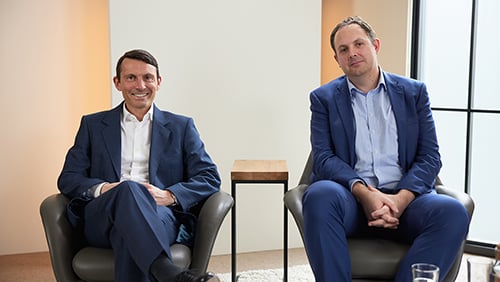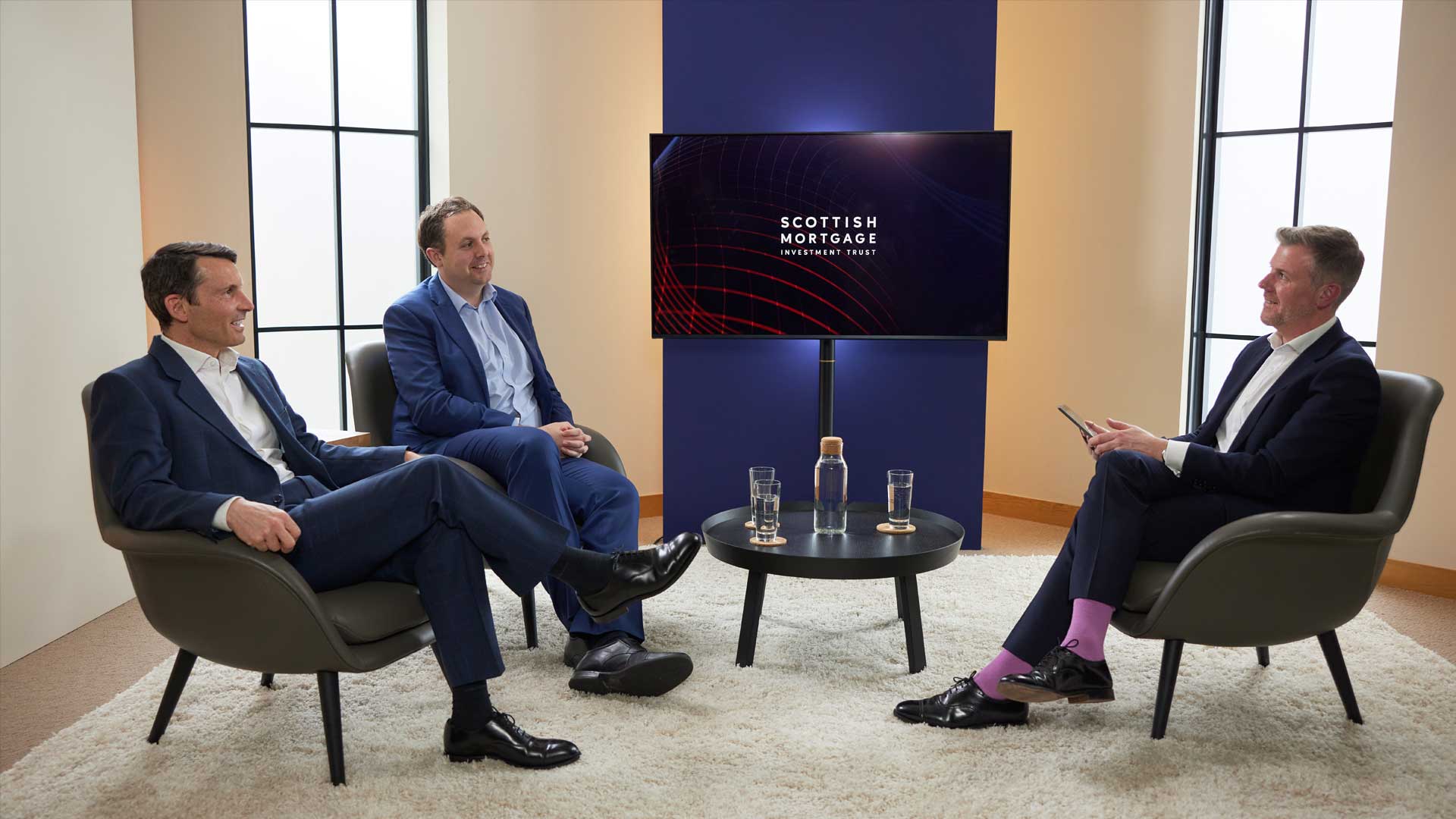Finding new fish to fry
James Anderson – Investment manager
As the world adapts to wrenching changes, James Anderson observes both human progress and stock markets that did not learn.

The value of shares in Scottish Mortgage, and any income from them, can fall as well as rise and investors may not get back the amount invested.
We cannot know the consequences of Covid-19 beyond human tragedy. It is presumptuous to make predictions about complex and inherently uncertain matters at any time. Under conditions of stress in society and markets it is even more dangerous. We are better observing rather than concluding prematurely. When faced with the extraordinary it’s far too easy to retreat to preconceptions. As investors we would like to see the current crisis provoke a further acceleration in digitalisation and healthcare innovation. As observers we would hope that the current crisis will prompt increased concern over the threat driven by other extreme outcomes in inequality or climate decay. But it isn’t at all clear that these are more than pious hopes. It is far harder to identify how and why the pandemic has changed our views. Generally it’s perilously early to do so. It’s also dangerous to focus solely on one event however terrible. Two years ago this report quoted the late, great Hans Rosling. He frequently cited a global pandemic as his greatest fear. But he also warned that unusual and negative events warp our minds: ‘If we are not extremely careful, we come to believe that the unusual is usual: that this is what the world looks like.’ At some point he emphasised that we need to return to ‘the secret, silent miracle of human progress’.
The end of carbon
One such miracle may already have occurred. It may eventually be seen as equally historic and as beneficial as the pandemic has been malign. The age of carbon may have ended before the virus spread. For all the drama of the Saudi-Russian clash or of negative oil prices this was a transformation long foretold but finally turning unstoppable in the first quarter of 2020. The remorseless fall in the prices of renewable energy has at last translated into savage competition against traditional fuels. In the first three months of 2020, 52% of German electricity came from renewables. In the UK that figure was 45%. No wonder the share prices of Exxon, BP and Schlumberger were already falling sharply in January and February. Sad though it is to say pandemics are far more common than energy transitions in the history of the world. The rise of renewables and the electrification of transportation will be central to the investing world of the next twenty years at least. It matters.
Geography
Covid-19 has already exacerbated the name calling between America and China. It could hardly be otherwise given the characteristics of leadership in both countries. But it seems clear to us that the geographical centre of the global economy continues to move to Asia, generally at an accelerated pace. This is an observation not an endorsement of one country or a political system. It’s likely at the simplest level that Asian GDP can grow in 2020. That’s improbable in the USA and impossible in Europe. Before and beyond the virus we have been disconcerted by the extent to which business model leadership and systemic dynamism appear to be fading in America, even on the West coast. This too appears to be in contrast to Asia and, in the world of corporate giants, particularly relative to China. I will leave the specific examples to Tom Slater to discuss in the report to shareholders in his Scottish Mortgage Manager’s Review.

Risk and the index
Scottish Mortgage has long believed in the energy revolution. But we cannot become unduly confident. It’s critically important to test all our beliefs. This applies more strongly to our general contentions than to our individual stock decisions. The latter are necessarily subject to specific uncertainties that we cannot wish or diversify away. But if our underlying beliefs are structurally wrong and we are therefore unable to make sense of the investing world for a prolonged period, then we need to reassess. We need to ask ourselves if our philosophy is adapted to the world as it will be rather than as we hope it is. This applies at all times. It applies at least as much when we have been successful as in times of disappointment. It applies even more when the shape of the investing world is changing dramatically.
Two years ago in this report we wrote that ‘We do not share the presumption that Scottish Mortgage is doomed to suffer unduly in a bear market. To us the underlying cause of the next market retreat is most likely to be the dawning realisation that broad swathes of the stock market that are assumed to be strong and stable in difficult market conditions are instead acutely vulnerable to severe setbacks’. Three years ago we said that ‘We do not accept that risk resides in owning a portfolio that is different from the index’ and suggested that this definition of risk owed more to the self-interest of the investment industry than to economic reality. We did not predict the current pandemic although the possibility of such a disaster was always present as experts in healthcare and fragility have repeatedly observed. So we did not suspect that the trigger for the collapse in the businesses and share prices of so many major index constituents would lie in COVID-19. But they were indeed vulnerable to severe setbacks even if we expected this to unwind over a decade not a year.
There’s not much evidence that capital market ideology will take much notice of the crass failings of its prescriptions. Managers and consultants will continue to talk to themselves of tracking errors and Sharpe ratios as risk controls (the reader is fortunate if they are unexposed to such terms) whilst their clients suffer. The curriculum of the ever more dominant Chartered Financial Analyst (CFA) will not change although its teachings bear little resemblance to market outcomes.
These comments are meant to convey meaning beyond irritation. The opportunity for us in the last decade has come about because stock markets did not learn. This is unusual. Normally investors, speculators and traders leap restlessly onto new paradigms however questionable their underpinnings. But that hasn’t happened despite, for example, the clear evidence of the power of the internet, the increasing returns to scale it tends towards and the consequent deep competitive moats it offers. Instead of embracing exponential growth, investors and asset allocators have fled. Performance chasing has its own evils but replacing it with endless rebalancing towards ‘value’ strategies backed by a blind conviction that reversion to the mean is inevitable has been an investment tragedy. It’s largely been prompted by misguided theorising. But the theory has been reinforced by the extraordinary grip that Warren Buffett has exercised over the investment world. Of course the very long term record of Berkshire Hathaway is brilliant, of course Buffett has a splendid way with words and the public, of course he doesn’t believe in the silliness of risk as divergence from the index. But Buffett’s success has sanctified a freezing of the investment narrative. Or as Buffett’s brilliant partner, Charlie Munger, puts it with the clarity of a 96 year old, too many investors are ‘like a bunch of cod fishermen after all the cod’s been overfished...that’s what happened to all these value investors. Maybe they should move to where the fish are’. So where will the fish be in the future?
Whilst the collective investment world has shown little enthusiasm for shifting to new hunting grounds the market has adapted, as it does, without most participants. This carries potential problems. The universe of great growth whales is swallowing the minnows. At one point in April the US Nasdaq index, dominated by technology companies, enjoyed a market capitalisation greater than all the developed markets outside America. Or on a plaintive local note Amazon and Alphabet combined are more highly capitalised than all quoted British companies. It’s not clear that this is unjustified. Moreover the perception of relative vulnerability has changed. Most investors craving safety now see Amazon and its kin as far less exposed to economic angst. In general our quoted portfolio has therefore become more conventional and gradually, then suddenly, less differentiated from the index than in the past. This does not unduly concern us at present as the world adapts to wrenching changes but it may become an issue in the future. We must continue to evolve.
Risk factors
The trust invests in overseas securities. Changes in the rates of exchange may also cause the value of your investment (and any income it may pay) to go down or up.
The trust has a significant investment in private companies. The trust’s risk could be increased as these assets may be more difficult to sell, so changes in their prices may be greater.
The trust invests in emerging markets where difficulties in dealing, settlement and custody could arise, resulting in a negative impact on the value of your investment.
About the author - James Anderson
Investment manager
James was the manager and then joint manager of Scottish Mortgage Investment Trust between 2000 and 2022. He was also a co-manager of the International Concentrated Growth and Global Outliers Strategies. James chaired the International Growth Portfolio Group from its inception in 2003 until July 2019 and was also Co-Manager of Vanguard International Growth. In 2003, James co-founded our Long Term Global Growth Strategy. Before that, he headed our European Equity team. James served as a member of the Advisory Board of the government-sponsored Kay Review and as Chair of the subsequent industry working group that set up the UK Investor Forum. He joined Baillie Gifford in 1983 and became a partner in 1987. James graduated BA in History from the University of Oxford, and after postgraduate study in Italy and Canada, he gained an MA in International Affairs in 1982. James is currently a Trustee of the Johns Hopkins University and Chairman of the Swedish investment company Kinnevik.
Important information
This communication was produced and approved at the time stated and may not have been updated subsequently. It represents views held at the time of production and may not reflect current thinking.
This content does not constitute, and is not subject to the protections afforded to, independent research. Baillie Gifford and its staff may have dealt in the investments concerned. The views expressed are not statements of fact and should not be considered as advice or a recommendation to buy, sell or hold a particular investment.
Baillie Gifford & Co and Baillie Gifford & Co Limited are authorised and regulated by the Financial Conduct Authority (FCA). The investment trusts managed by Baillie Gifford & Co Limited are listed on the London Stock Exchange and are not authorised or regulated by the FCA.
A Key Information Document is available by visiting our Documents page.
Any images used in this content are for illustrative purposes only.







